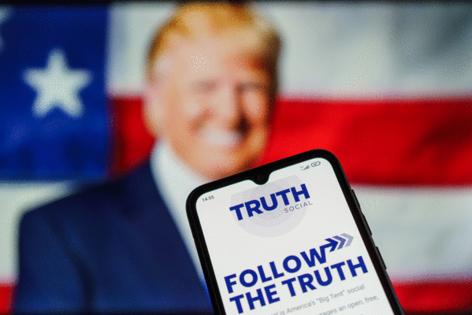Trump's words could trip up any prosecutions against political foes
Published in News & Features
President Donald Trump’s own recent words and actions could end up undermining any criminal cases that he has encouraged against several of his political foes, some legal experts say.
The Republican president in a social media post on Saturday demanded that Attorney General Pamela Bondi move quickly to prosecute New York Attorney General Letitia James, former FBI Director James B. Comey and Sen. Adam B. Schiff, D-Calif., who as a House member had a key role in the first impeachment proceeding against Trump.
“We can’t delay any longer, it’s killing our reputation and credibility,” Trump said in the post, addressing the attorney general by her first name. “They impeached me twice, and indicted me (5 times!), OVER NOTHING. JUSTICE MUST BE SERVED, NOW!!!”
The words, which came along with his forcing out a U.S. attorney who had not brought charges against James and Comey, were an extraordinary public incursion by the White House into the department’s traditional independent decision-making, particularly on criminal prosecutions against public officials.
But legal experts say it’s precisely those words that could hurt the government’s case if criminal charges are brought against those perceived adversaries, individuals that Trump has a long history of demonizing.
The Trump-appointed head of the Federal Housing Finance Agency made a criminal referral to the Justice Department earlier this year, accusing Schiff of falsifying bank documents and property records to “acquire more favorable loan terms.”
Schiff’s legal team has denied wrongdoing. A U.S. attorney in Maryland is reportedly leading an inquiry into Schiff.
Randall Eliason, a former federal prosecutor, argued that even if the cases lead to indictments, “they will have zero credibility with the court or the public after this series of events.”
“The defense will move to dismiss the charges based on legal doctrines such as vindictive or selective prosecution, and Trump’s own social media posts will be Exhibit 1,” Eliason wrote in a post.
“One of the many extraordinary things about Trump’s post is the final lines, where he admits the reason he wants prosecutors to pursue his political enemies is that they impeached and indicted him,” Eliason wrote.
Selective prosecution
Schiff and other targets could point to Trump’s comments in arguing that any potential charges should be thrown out due to selective prosecution — a legal claim a New Jersey congresswoman is pursuing in her criminal case.
The pushing out of a U.S. attorney could also bolster arguments that any criminal charges should be thrown out, some legal experts say.
Trump days ago said he forced out Erik Siebert from his role leading the U.S. attorney’s office for the Eastern District of Virginia. Siebert’s departure comes amid media reports that the Trump appointee failed to charge James and Comey.
Over the weekend, Trump identified Lindsey Halligan, an ally of his, to lead the office, and Bondi on Monday announced Halligan was sworn in as the interim U.S. attorney for the Virginia district.
Trump wrote that Halligan is a “loyal attorney” who worked with him “in the winning fight against the Weaponization of our Justice System by Crooked Joe Biden and the Radical Left Democrats.”
Bennett L. Gershman, law professor at Pace University and an expert in prosecutorial misconduct, said that sort of replacement could easily find its way into a motion to dismiss, if charges are brought.
“That would be front and center in a legal filing,” Gershman said.
Trump, in a Saturday post, said he had read that Schiff, James and Comey were “‘all guilty as hell, but nothing is going to be done.’”
The senator this weekend posted an image of those Trump comments demanding prosecutions. “There’s no hiding the political retaliation and weaponization,” Schiff wrote. “It’s all out in the open.”
Prosecutions against Schiff, James or Comey could also test the government’s reputation for bringing good faith prosecutions, depending on the strength of the evidence, legal experts say. Grand juries could push back on flimsy cases and decline to indict, or judges could take a closer look at claims of selective prosecution.
Stephen Saltzburg, a law professor at George Washington University, said the president has created a public record of him, in essence, demanding that people be prosecuted because they are his foes. Ordinarily, it would be almost impossible to prove that somebody was focused on and singled out for an unconstitutional reason, Saltzburg said.
“President Trump has essentially said, ‘That’s what I want,’” Saltzburg said.
Rep. LaMonica McIver, a New Jersey Democrat who is facing a three-count indictment in federal court after an altercation with authorities outside an immigration detention facility earlier this year, is testing selective enforcement and prosecution claims in her case.
Her legal team argued that the Justice Department walked away from prosecutions against Capitol riot defendants who assaulted law enforcement officials on Jan. 6, 2021. But prosecutors are still pursuing a case against McIver under the same statute, they argue.
“They cannot pursue charges against her because she is a Democrat who conducts oversight of Executive Branch immigration policy, while dismissing charges brought under the same statute against those whose views they share and who engaged in conduct far more egregious,” her attorneys said in the filing.
In a potential case against Schiff, Evan Barr, a partner at Reed Smith and former federal prosecutor, expressed skepticism that a selective prosecution claim could win the day in court.
Selective prosecution does apply to the bringing of criminal charges in the first instance, Barr said, but meeting all the elements is “very difficult, almost impossible, and it’s only happened very rarely.”
_____
©2025 CQ-Roll Call, Inc., All Rights Reserved. Visit cqrollcall.com. Distributed by Tribune Content Agency, LLC.







Comments